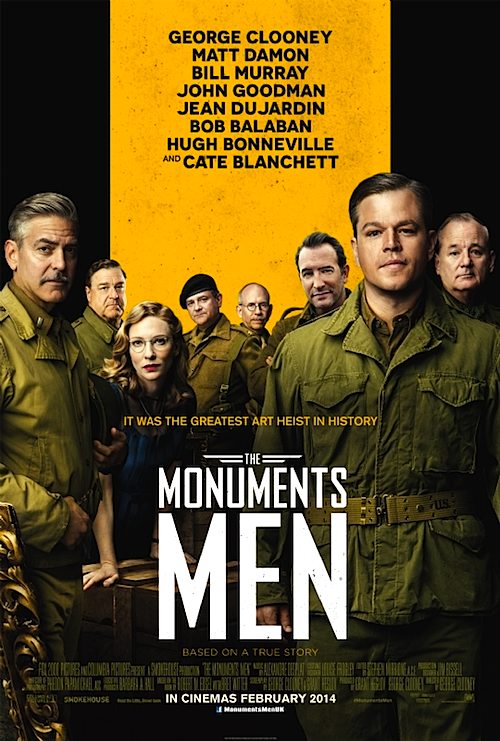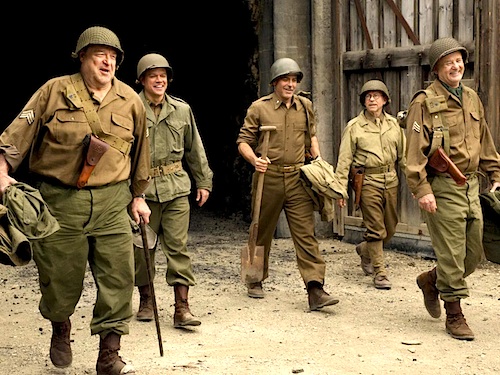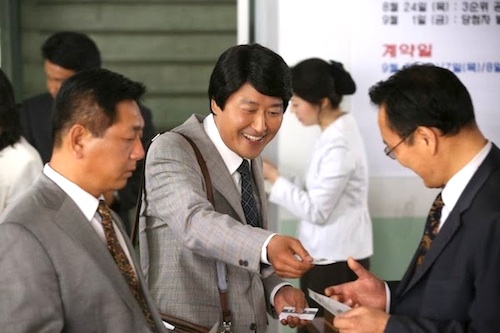 By Joe Bendel. They were the elite of America’s elite, but they readily answered the call to serve. Recruited for their knowledge of art and architecture, this special corps was tasked with preserving important cultural landmarks and restituting plundered artwork, despite having no real operational authority. The nearly 345 men and a handful of women who served in the Allied armies’ Monuments, Fine Arts, and Archives (MFAA) program are boiled down to eight cultured but courageous souls in George Clooney’s The Monuments Men, which opens today nationwide.
By Joe Bendel. They were the elite of America’s elite, but they readily answered the call to serve. Recruited for their knowledge of art and architecture, this special corps was tasked with preserving important cultural landmarks and restituting plundered artwork, despite having no real operational authority. The nearly 345 men and a handful of women who served in the Allied armies’ Monuments, Fine Arts, and Archives (MFAA) program are boiled down to eight cultured but courageous souls in George Clooney’s The Monuments Men, which opens today nationwide.
Even today, the scale of the National Socialist war machine’s systematic looting boggles the mind. Old masters were eagerly sought to fill Hitler’s Fuhrermuseum, a grandiose monstrosity planned for his hometown of Linz, while art deemed “degenerate” was destroyed. Alarmed by the threat to Europe’s artistic legacy, Frank Stokes (modeled after George Stout) is given the go-ahead to form the Monuments Men. Like a Harvard-educated Billy Ocean, he proceeds to recruit a clean half-dozen, including James Granger, the Met’s curator of medieval art (based on James Rorimer), sculptor Walter Garfield (strongly suggestive of Walker Hancock), and ballet impresario Preston Savitz (transparently inspired by one of the best known Monuments Man, Lincoln Kirstein).
Initially, Stokes mostly encounters hostility from his fellow officers, who understandably place the safety of their men far above that of a few statues or a pretty fountain. However, with the help Sam Epstein (based on Harry Ettlinger, one of the last surviving Monuments Men), a German-speaking Jewish immigrant enlisted man, Stokes’ men start developing leads on the National Socialists’ vast caches of stolen art. Nevertheless, even though the military tide has turned in the Allies’ favor, the clock is ticking furiously for the Monuments Men. Retreating Nazi forces have been instructed to destroy the secret art stashes, as part of the infamous Nero Decree. Making matters more complicated, the Soviets also deployed so-called Trophy Brigades on a mission to re-plunder art looted by the National Socialists as supposed “war reparations.”
To their credit, Clooney and co-screenwriter-co-producer Grant Heslov (adapting Robert Edsel’s nonfiction book) make the distinction between the Monuments Men and the Trophy Brigades as clear as day and night. They consistently honor the sacrifices made by the Monuments Men, getting genuinely patriotic down the stretch. In a big picture sense, the film does right by its heroic subjects. However, it gets rather bogged down in a draggy midsection, wherein the Magnificent Seven plus Epstein split up for a series largely unnecessary misadventures. Still, the third act picks up the tempo quite nicely.

Stokes/Stout is a perfect vehicle for the smooth-on-the-outside, deep-on-the-inside screen persona Clooney has developed over the years. We can easily believe he is both a learned scholar and officer material. John Goodman, Bill Murray, and Bob Balaban just sort of do their shtick as Garfield/Hancock, architect Richard Campbell, and Savitz/Kirstein, but Downton’s Hugh Bonneville gives the film unexpected heft and tragic dignity as Donald Jeffries, an art world cad seeking redemption.
Anyone interested in the Monuments Men and the National Socialist campaign of pillage should watch Berge, Newnham & Cohen’s The Rape of Europa, which is easily one of the best documentaries of the last ten years. Clooney dramatizes their story well enough, but just barely legs out a double rather than knocking it out of the park. Still, for those looking for a stirring war story with a dash of American exceptionalism, it is the only game in town this week. Recommended as a serious but reasonably entertaining WWII film, Monuments Man opens in wide release today (2/7), including the AMC Empire in New York.
LFM GRADE: B
Posted on February 7th, 2014 at 3:36pm.
